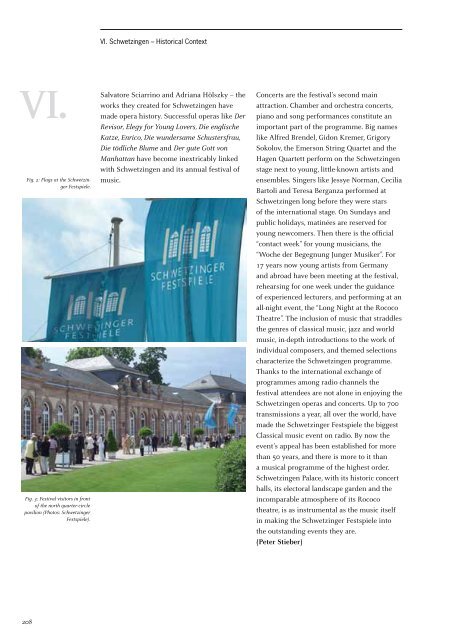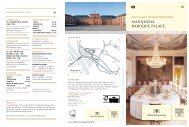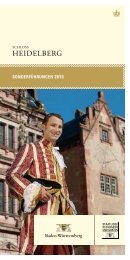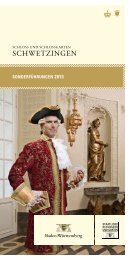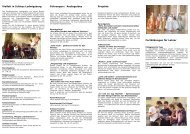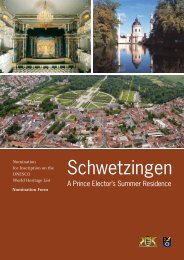Schwetzingen - Schlösser-Magazin
Schwetzingen - Schlösser-Magazin
Schwetzingen - Schlösser-Magazin
You also want an ePaper? Increase the reach of your titles
YUMPU automatically turns print PDFs into web optimized ePapers that Google loves.
VI.<br />
Fig. 2: Flags at the Schwetzinger<br />
Festspiele.<br />
Fig. 3: Festival visitors in front<br />
of the north quarter-circle<br />
pavilion (Photos: Schwetzinger<br />
Festspiele).<br />
208<br />
VI. <strong>Schwetzingen</strong> – Historical Context<br />
Salvatore Sciarrino and Adriana Hölszky – the<br />
works they created for <strong>Schwetzingen</strong> have<br />
made opera history. Successful operas like Der<br />
Revisor, Elegy for Young Lovers, Die englische<br />
Katze, Enrico, Die wundersame Schustersfrau,<br />
Die tödliche Blume and Der gute Gott von<br />
Manhattan have become inextricably linked<br />
with <strong>Schwetzingen</strong> and its annual festival of<br />
music.<br />
Concerts are the festival’s second main<br />
attraction. Chamber and orchestra concerts,<br />
piano and song performances constitute an<br />
important part of the programme. Big names<br />
like Alfred Brendel, Gidon Kremer, Grigory<br />
Sokolov, the Emerson String Quartet and the<br />
Hagen Quartett perform on the <strong>Schwetzingen</strong><br />
stage next to young, little-known artists and<br />
ensembles. Singers like Jessye Norman, Cecilia<br />
Bartoli and Teresa Berganza performed at<br />
<strong>Schwetzingen</strong> long before they were stars<br />
of the international stage. On Sundays and<br />
public holidays, matinées are reserved for<br />
young newcomers. Then there is the official<br />
“contact week” for young musicians, the<br />
“Woche der Begegnung Junger Musiker”. For<br />
17 years now young artists from Germany<br />
and abroad have been meeting at the festival,<br />
rehearsing for one week under the guidance<br />
of experienced lecturers, and performing at an<br />
all-night event, the “Long Night at the Rococo<br />
Theatre”. The inclusion of music that straddles<br />
the genres of classical music, jazz and world<br />
music, in-depth introductions to the work of<br />
individual composers, and themed selections<br />
characterize the <strong>Schwetzingen</strong> programme.<br />
Thanks to the international exchange of<br />
programmes among radio channels the<br />
festival attendees are not alone in enjoying the<br />
<strong>Schwetzingen</strong> operas and concerts. Up to 700<br />
transmissions a year, all over the world, have<br />
made the Schwetzinger Festspiele the biggest<br />
Classical music event on radio. By now the<br />
event’s appeal has been established for more<br />
than 50 years, and there is more to it than<br />
a musical programme of the highest order.<br />
<strong>Schwetzingen</strong> Palace, with its historic concert<br />
halls, its electoral landscape garden and the<br />
incomparable atmosphere of its Rococo<br />
theatre, is as instrumental as the music itself<br />
in making the Schwetzinger Festspiele into<br />
the outstanding events they are.<br />
(Peter Stieber)


